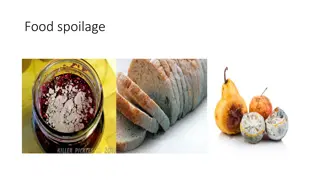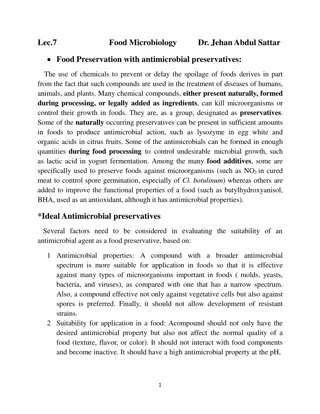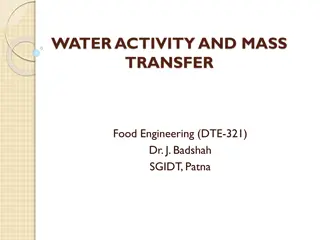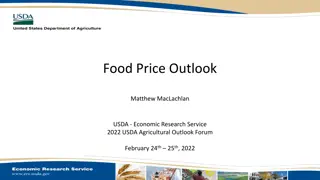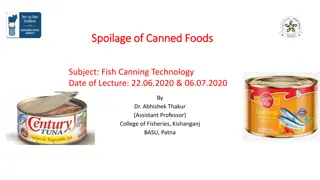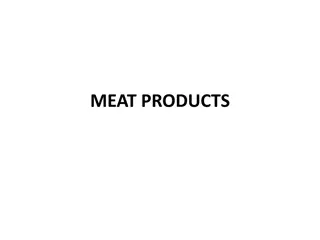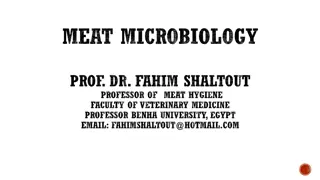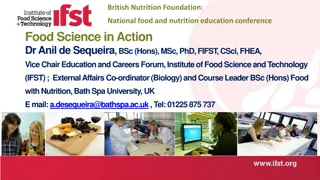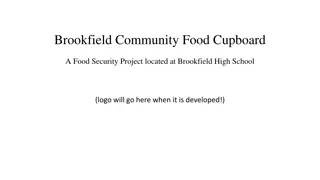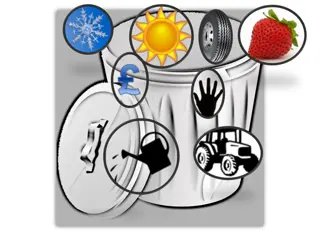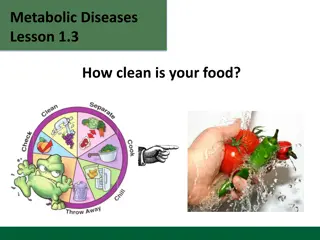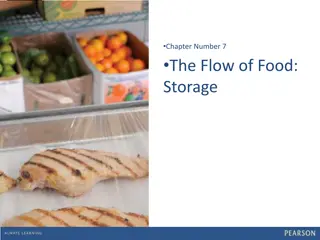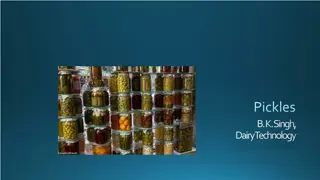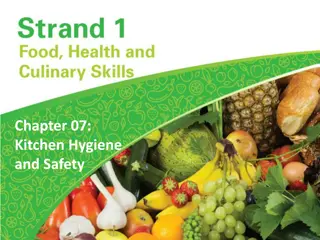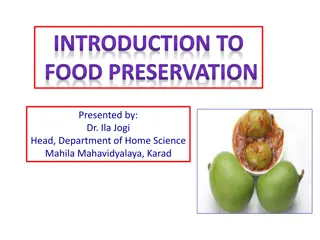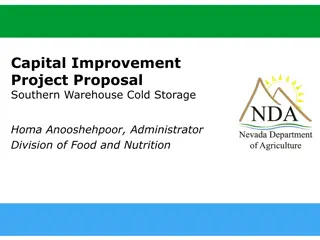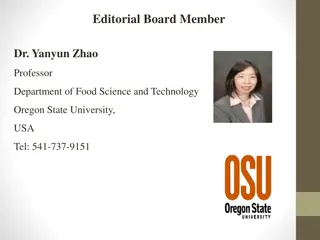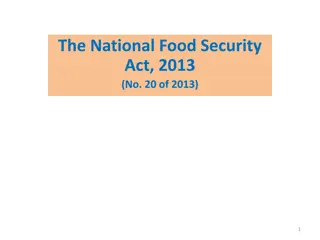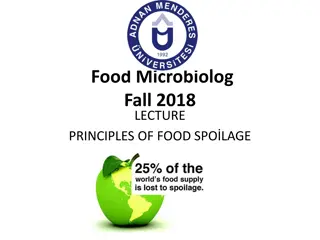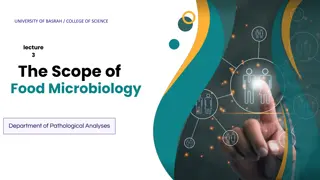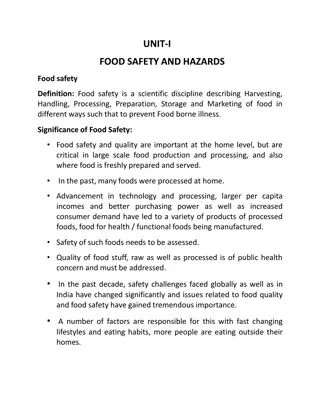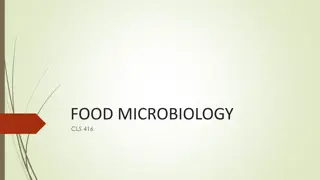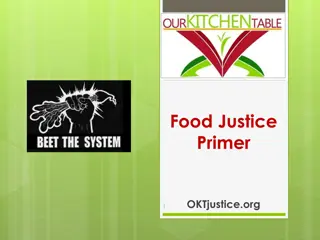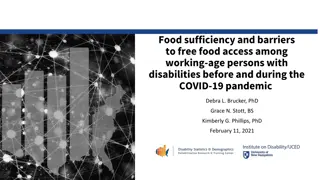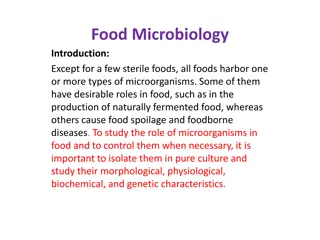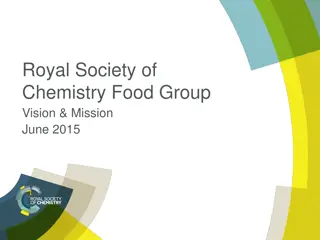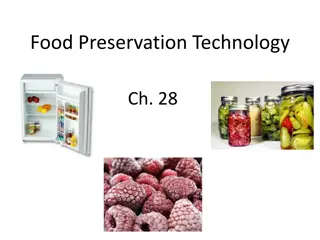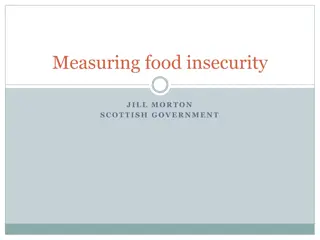Role of Microorganisms in Food and Industry
Microorganisms play a crucial role in the food and industrial sectors, both benefiting and causing harm. They are involved in processes such as organic compound transformation, fermentation, and food production. While beneficial microorganisms contribute to the creation of various useful food produc
5 views • 44 slides
Food spoilage
In this lecture from the Department of Pathological Analyses at the University of Basrah, Prof. Dr. Saad S. Mahdi Al-amaradi Al-Amara discusses food spoilage, focusing on cereals, bakery foods, and meat products. The presentation covers the microbial spoilage of grains, including common mold species
0 views • 9 slides
How are plant essential oils valuable as functional ingredients
Food Research Lab is one of the leading food industry consultants and offers various food production services. We provide food production and food manufacturing consultancy services to food, beverage and nutraceutical companies. Primary food production involves everything from food procurement, inve
8 views • 12 slides
Understanding Food Spoilage: Causes and Effects
Food spoilage is the deterioration of food to the point where it is no longer safe or suitable for consumption. It can occur due to various factors such as insect damage, physical injury, enzymatic degradation, microbial growth, temperature fluctuations, and more. Different types of spoilage can be
0 views • 24 slides
Food Preservation with Antimicrobial Preservatives
Food preservation with antimicrobial preservatives involves the use of chemical compounds to prevent or delay food spoilage. These compounds, either naturally present or added during processing, can kill microorganisms or control their growth in foods. Factors for evaluating the suitability of an an
6 views • 8 slides
Understanding Water Activity and Mass Transfer in Food Engineering
Water activity (aw) plays a crucial role in microbial activity, chemical and physical changes in foods, and the dehydration process. Maintaining water activity below specific levels can prevent microbiological spoilage and deterioration reactions, while also affecting texture, aroma, and overall qua
0 views • 11 slides
Overview of Food Price Trends and Consumer Expenditures in the US
The presentation highlights the consumer spending on food, food price trends over time, 2021 food prices, and forecasts for 2022 in a historical context. It emphasizes that U.S. consumers spent 12% of their expenditures on food in 2020, aligning with historical averages. Food price inflation remaine
0 views • 21 slides
Understanding Spoilage of Canned Foods in Fish Canning Technology
Food spoilage in canned foods, especially in fish products, can be caused by microbial, chemical, and physical factors. Issues like dents or rusting on the can surface can also lead to spoilage. Microbial spoilage during canning process can result in various defects like swell, acidification, and ga
1 views • 16 slides
Understanding the Spoilage Flora in Raw Meat Products
Raw meat products are highly perishable due to the presence of various spoilage bacteria, yeasts, and molds. Factors such as nutrient availability, oxygen levels, storage temperature, and pH influence the predominant spoilage flora in meat. Psychrotrophic bacteria thrive in refrigerated storage, lea
0 views • 17 slides
Food Equipment Usage Guidelines for Safe Food Handling
Enhance your knowledge on using equipment for making food with proper safety procedures. Learn about essential points like wearing protective gear, checking hot food temperatures, food safety principles, and sanitization requirements. Understand machine settings, food temperature checks, and serving
1 views • 22 slides
National Food Reserve Agency (NFRA): Enhancing Food Security in Nigeria
The National Food Reserve Agency (NFRA) under the Federal Ministry of Agriculture & Water Resources plays a crucial role in addressing agricultural production, storage, and marketing challenges in Nigeria. With a vision to ensure sustainable food access for all Nigerians and become a global food pro
1 views • 30 slides
Best Practices for Food Preparation to Ensure Food Safety
This chapter highlights essential practices for prepping food to prevent cross-contamination and time-temperature abuse in a food service setting. Topics covered include safe methods for thawing food, cooking temperatures, microwave cooking, informing consumers of risks, requirements for partially c
1 views • 25 slides
Understanding Meat Microbiology: Challenges and Growth Phases
Meat microbiology is a crucial aspect of food science, focusing on organisms present in red meat, poultry, fish, and their products. This field addresses both preventing food spoilage and protecting consumers against foodborne illnesses. Challenges arise from slaughtering to home consumption, where
0 views • 124 slides
Factors Affecting Microbial Growth in Foods
Moisture content and pH levels are key factors influencing the growth and survival of microorganisms in foods. The water activity (aw) of food substrates affects microbial growth, with bacteria and fungi having varying requirements. Lowering aw below optimum levels can increase the lag phase of grow
2 views • 15 slides
Exploring Food Science and Technology in Modern Society
Delve into the world of food science and technology with insights on what scientists do, the importance of understanding food, definitions of food science and food technology, factors affecting food spoilage, and traditional and modern food processing technologies. Gain knowledge on testing hypothes
0 views • 22 slides
Food Safety Practices in Service Industry
This chapter focuses on the essential food safety practices in the service industry, covering topics such as time and temperature requirements for holding food, ways to prevent time-temperature abuse and cross-contamination, minimizing bare-hand contact with food, preventing staff and customers from
0 views • 26 slides
Brookfield Community Food Cupboard: Addressing Food Insecurity at Brookfield High School
Brookfield Community Food Cupboard is a project aiming to provide food security to individuals and families in the Riverside Park/Hunt Club area, including students and families served by Brookfield High School. The initiative seeks to supplement existing food security programs by offering a day's w
0 views • 11 slides
Food Storage Tips and Energy Consumption Awareness
Learn about the various sources of energy used in the food supply chain, from production to consumption. Understand the correct places to store different types of food items, such as fruits, vegetables, dairy products, and cooked foods. Discover valuable notes on storing food properly to maintain fr
0 views • 5 slides
Food Safety and Preventing Food-borne Illness
This lesson focuses on the importance of food safety, addressing how clean our food is and at what points safety can be compromised. It delves into common types of microbes that contaminate foods and explores ways in which food safety can be compromised. The activity involves case studies on food sa
0 views • 11 slides
Mastering Good Food Hygiene and Storage Practices
Understanding food spoilage causes, common food-poisoning bacteria, conditions for bacterial growth, ways to prevent food contamination, safe food handling practices, HACCP concept, types of perishable foods, importance of proper food storage, packaging materials for food, and recognizing signs of f
1 views • 27 slides
Food Storage and Handling Best Practices
Explore the essential guidelines for storing and handling food, including labeling, date marking, rotation techniques, temperature requirements, and prevention of cross-contamination. Learn about key terms like FIFO and ROP, as well as proper labeling requirements for on-site and packaged foods. Und
0 views • 21 slides
All About Pickles: Types, Preservation, and Spoilage
Pickles, a beloved food item known for their unique taste and variety, are an essential part of many cuisines around the world. This article explores the different types of pickles, methods of preservation using common preservatives like salt and vinegar, as well as signs of spoilage to watch for. F
0 views • 14 slides
Understanding Kitchen Hygiene and Food Safety
Kitchen hygiene and food safety are crucial to prevent food spoilage and food poisoning. Factors like enzymes, micro-organisms, and oxygen can lead to food spoilage, while food poisoning occurs when pathogenic bacteria multiply in consumed food. Practicing proper hygiene, storage, and preparation me
0 views • 27 slides
Understanding Food Preservation: Techniques and Importance
Food preservation is a crucial aspect of ensuring food safety, extending shelf life, and preventing spoilage. This article delves into the definition of food preservation, its objectives, and the importance of preserving foods. From preventing microbial contamination to increasing food availability,
0 views • 10 slides
Improving Southern Warehouse: Cold Storage Project Proposal
The Division of Food and Nutrition at agri.nv.gov is proposing a capital improvement project for the Southern warehouse to address challenges with third-party cold storage. The current arrangement has led to food spoilage, delivery delays, and compliance difficulties. The proposal aims to develop on
0 views • 10 slides
Dr. Yanyun Zhao - Food Science & Technology Professor at Oregon State University
Dr. Yanyun Zhao is a prominent Professor at Oregon State University specializing in food science and technology. With a strong research focus on food processing technologies and food safety, Dr. Zhao has made significant contributions to the field. Her expertise in value-added food processing, antim
0 views • 16 slides
National Food Security Act, 2013 Overview
The National Food Security Act, 2013 (NFSA) aims to ensure food and nutritional security for all by providing access to adequate quality food at affordable prices. It includes provisions for hot cooked meals, food security allowance, social audit, nutritional support for children, and various monito
0 views • 15 slides
Principles of Food Spoilage: Understanding Microbial and Nonmicrobial Factors
Explore the principles of food spoilage in the context of microbial and nonmicrobial influences. Topics covered include classification of foods based on stability, types of agents causing spoilage, prevention practices, and the criteria for acceptability of food. Learn about microbial growth, enzyme
0 views • 19 slides
Importance of Bottom to Top Shelving Order in Refrigerator Food Storage
When storing food in the refrigerator, following a bottom-to-top shelving order is crucial for maintaining food safety and freshness. This organization helps prevent cross-contamination, ensures proper air circulation, and maximizes storage space efficiency. By storing items properly in the refriger
0 views • 22 slides
Insights into Airborne Microorganisms and Fungi: Implications for Food Safety
Airborne microorganisms and fungi play crucial roles in food microbiology, with various species surviving in the atmosphere despite hostile conditions. Bacteria like Bacillus and Streptomyces disperse through air turbulence, while fungi such as Penicillium and Aspergillus produce spores resistant to
0 views • 9 slides
Importance of Food Safety in Modern Food Production
Food safety is crucial in modern food production to prevent foodborne illnesses. With advancements in technology and increased demand for processed foods, the need to ensure the safety and quality of food has become paramount. Factors affecting food safety include poor hygiene practices, contaminate
0 views • 30 slides
Understanding the Impact of Microorganisms on Food
Microorganisms play a vital role in food supply, either beneficial for food bioprocessing or undesirable causing food spoilage and foodborne diseases. They can be utilized for food preservation and probiotics, but their growth and enzymatic activities can also lead to food deterioration. This articl
0 views • 9 slides
Understanding Food Justice and Insecurity: A Comprehensive Overview
Food Justice Primer provides insightful definitions and discussions on key concepts such as food justice, food insecurity, food sovereignty, and food deserts. It highlights the need for equitable sharing of benefits and risks in the food system, aiming to transform current disparities and inequities
0 views • 49 slides
Food Sufficiency and Barriers to Free Food Access Among Working-Age Persons with Disabilities Before and During COVID-19 Pandemic
Working-age persons with disabilities face economic vulnerability and higher chances of living in food-insecure households. This study explores food sufficiency and barriers to accessing free food during the COVID-19 pandemic. Data was collected through an online survey, revealing insights into food
1 views • 14 slides
Exploring the World of Food Microbiology
The field of food microbiology delves into the intricate relationship between microorganisms and food, covering aspects such as fermentation, spoilage, and probiotics. Discoveries by pioneers like Pasteur paved the way for understanding the roles of microorganisms in food production and preservation
0 views • 21 slides
Royal Society of Chemistry Food Group Vision & Mission Summary
The Royal Society of Chemistry Food Group aims to lead, promote, and disseminate the understanding and importance of chemistry in food. Their vision is to enhance food and nutrition security through advancing the chemistry of food ingredients. They strive to engage with various communities to promot
0 views • 4 slides
Food Preservation Technologies: Freezing, Freeze-Drying, and Irradiation
Explore the various methods of food preservation such as freezing, freeze-drying, and irradiation. Learn how freezing slows enzyme action and prevents microbial growth, while freeze-drying preserves food by removing moisture through sublimation. Discover how irradiation destroys spoilage organisms t
0 views • 11 slides
Understanding Food Science and Nutrition: A Comprehensive Guide
Explore the world of food science and nutrition through topics like macronutrients, cooking methods, food safety, influences on food choice, waste management, and health implications. Learn about essential nutrients, food preparation techniques, and factors affecting our dietary decisions. Gain insi
0 views • 24 slides
Understanding Food Insecurity Measurement in Scotland
The report emphasizes the importance of understanding and addressing food insecurity effectively in Scotland. It discusses the dignity in ending hunger, the rights to nutritious food, and the limitations of emergency food aid. The Food Insecurity Experience Scale is highlighted as a tool for measuri
0 views • 7 slides
Understanding Food Costing and Pricing in the Food Industry
Explore the factors influencing food costs in the restaurant industry, including the importance of food cost percentage, pricing strategies, and impact of location on food prices. Learn about managing food costs, controlling waste, and optimizing profitability through effective cost analysis and men
0 views • 12 slides



